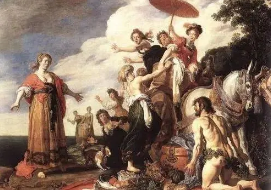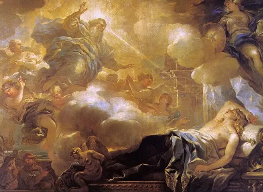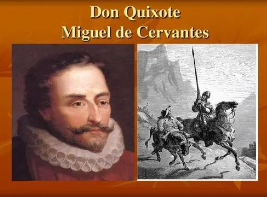The 80 most Common Allusions to Western Literature are so useful (3)
10 min read
This week we continue with these literary allusions;51 Superman From Nietzsche, Thus Spoke Zarathustra. Nietzsche believed that Superman was an idealized all-rounder who represented the ruling class. “One man,” he said, “can make millions of years of history alive — that is, one full, solid, great, complete man is better than countless fragmentary, petty men.” A metaphor for self-important egoists who are above everything else. It also refers to people whose abilities are exceptional and beyond the ordinary. A person who practices self-restraint and self-tempering due to a certain belief, refuses the temptation of material and flesh, and endures the oppression of harsh environment.
52 Superfluous people From the Russian novel Diary of a Superfluous Man. A typical Russian aristocratic intellectual of the 19th century. They did not want to associate themselves with the aristocracy and high society. However, because they were far away from the people and could not get rid of the aristocratic position, their spirits were depressed, their emotions were negative, and they lacked the purpose of life, so they could not do anything. It’s a metaphor for the idler who eats all day and does nothing.
53 The runaway Nala.
Nala is the protagonist of Ibsen’s A Doll’s House. She was a simple-minded young woman who was content with her family’s happiness, but her husband, Helmer, only treated her as a doll. Later, Nora saw her husband’s selfish and mean nature. After the awakening of Nala in Christmas night resolutely left the “doll’s house”. The latter describes women who resist their husbands’ domestic despotism and pursue their own independent personality and happiness.
The Halold indifference.
From the English poet Byron’s long poem “Childe Harold’s travels”. Childe Harold is a liberal democratic thought of the British aristocracy rebel, he hated the past, dissatisfied with the reality, but did not have the courage to fight, his heart is always cold. It is a metaphor for the indifferent attitude of intellectuals who are unwilling to reconcile and disdain to fight against the corrupt social reality.
55 Robinson and Friday.
“Robinson” and “Friday” are both English writer Defoe’s novel “Robinson Crusoe” characters. When Robinson went to Africa by boat, he encountered a storm at sea and drifted to an island. In order to survive, he stubbornly fought against the nature and lived on the island for 28 years, and developed a spirit of never being disappointed in anything. On a Friday in his 24th year on the island, he rescued a “wild man” from the sea and named him “Friday”. Three years later, the two men fled the island. Robinson returned to England and became a millionaire. Later, when writing articles, people often use the allusion of “Robinson and Friday” to criticize those who attempt to separate from the society and the people’s fantasy.
56 Uncle Sam.
Uncle Sam is the nickname of the United States. It was created during the War of 1812 between the United States and Britain. An honest and capable meat packer in New York State was affectionately known as Uncle Sam. He served as quartermaster inspector for the states of New York and New Jersey, stamping barrels of beef and wine for the army. Beef drums at the plant were found to be covered with E.A.-U.S. The mark of Originally, E.A. It’s the name of a munitions contractor, U.S. It’s short for the United States. As it happens, the abbreviation of Uncle Sam is the same as that of the U.S., so people call the United States Uncle Sam. Americans regard Uncle Sam’s honesty, dependability, hard work and patriotism as their national pride and common qualities. In 1961, the U.S. Congress officially recognized Uncle Sam as the national symbol of the United States.
57 Giant with feet of clay.
The Old Testament is the Bible. Nebuchadnezzar king of Babylon dreamed of a colossus with a head of pure gold, a chest and arms of silver, a belly of bronze, legs of iron, and feet half iron and half clay. As he was watching, suddenly a stone came from heaven and shattered the Colossus’ clay feet, and the clay of gold, silver, copper and iron melted into powder. Later, people often used the term “mud-footed giant” to describe a giant that is strong on the outside but dry in the middle.
58 Passenger space.
“Hakrikon” is the image of a journalist in the famous play “Frontline” by the former Soviet writer Konetchuk. To make things out of nothing, make things up. He does not investigate understanding, sitting in command draft. Based on the news that the son of the commander of the front line was killed in action, he made up a story about how the son swore before he died and how the commander wept when he heard of his son’s death. As a result, the guest space has become a special word in news writing that is falsified, invented out of thin air. People write articles that refer to distorted news reports as “passenger-space”.
59 Dove of Peace.
(Genesis) God sent a flood on the earth, and it rained for forty days and forty nights, and there was no water on the earth, except the people and animals that were in Noah’s ark. When the rain stopped, Noah sent out a dove to detect the news outside. It was not until dusk that the dove came back. With a green olive leaf in her mouth, Noah’s flood is gone, and peace is at hand. Later the dove and the olive branch as a symbol of peace.
The Mystery of the Sphinx.
The Sphinx is a monster in Greek mythology that kills people by hiding them. His question to Oedipus was about a creature that walked on four feet in the morning, two at noon, and three in the evening. What is this? Oedipus answered, “Man.” He guessed correctly, and the Sphinx was ashamed and jumped off the cliff to his death. Metaphor for complex, mysterious, difficult to understand problem.
61 Augias’ cattle pen.
It comes from Greek mythology. Ogias was the son of the sea god, and he raised cattle without number, and the dung was piled up in mountains. An intractable problem that accumulates in piles or squalor.
62 Phoenix.
A bird from Greek mythology. It is said that the phoenix burns itself out once every 500 years and recovers its youth from the ashes. So the phoenix symbolizes eternity and rebirth.
The Buridan donkey.
It’s an allegory by 14th century French philosopher Lidain. A hungry donkey stood between two equal bales of hay, did not know how to eat the hay on the other side, and starved to death. It is a metaphor for those who are indecisive.
64 Dark Horse.
Racetrack slang for a horse that is unimpressive in appearance, but not in color. In 1861 Abraham, then unknown and unqualified. Lincoln was elected president of the United States for 16 times, so people once called him a dark horse president. A person or thing whose strength or value is difficult to predict.
65 Crocodile Tears.
Western legend, crocodile is very sinister cunning, when it snares prey, while greedy devour, while crocodile tears. It’s a metaphor for fake tears, fake sympathy. Later extended to hurt others, while pretending to be miserable sinister.
66 The Cross.
Crucifixion was a form of torture in the ancient Roman Empire. A prisoner sentenced to this kind of punishment carries a cross on his back to the place of execution. The Christian Bible said: Jesus was crucified on the cross, later Christianity will take this as a sign of faith, known as the “image of suffering”. So far, the cross has been used as a metaphor for suffering in Western literature.
67 The Ten Commandments.
Exodus (In the Old Testament) : After God came down in the thunder of Mount Sinai, he said to Moses the prophet of the Israelites, Obey the instructions I gave you, which I brought you out of Egypt out of the house of bondage: Trust no God but the Lord; B. You shall not make yourself an idol or bow down to any idol; C. You shall not take the name of your God, the Lord, in vain; D. To honor the Sabbath Day, to keep it holy, six days to work, seven days to rest; E. Honor your parents; F. You shall not kill; G. Do not commit adultery; H. You shall not steal; “You shall not bear false witness against your neighbor; Do not covet another man’s house, wife, manservant or maidservant, sheep or ox. Moses became the first legislator of the people of Israel, and the Ten Commandments became the sacred laws of Israel.
68 Eden.
(Genesis) God planted a garden in the East, the Garden of Eden, on a rich plain. In the garden grew beautiful trees bearing sweet fruit, and there were all kinds of birds and animals. God sent Adam to guard the garden. To save Adam from his loneliness, God took a rib from him and made Eve, a woman, to accompany him. They eat sweet fruit, walk in the forest grass, live a carefree, harmonious and happy life. Later generations used it as a metaphor for paradise.
69 Noah’s Ark.
Genesis: God was so distressed by the SINS of man that he decided to destroy him. Because Noah was a righteous man, God told him to build a boat to avoid the disaster. The latter refers to a savior in times of disaster, or a refuge in times of danger.
The Sword of Damocles.
It comes from a Greek historical legend. Damocles was a favorite of Dionysius, king of Syracuse in the 4th century BC. Dionysius, feeling insecure about his position, once invited Damocles to a splendid room where a sword hung by horse hair over the seat. Damocles was on pins and needles when he saw that his sword might fall from his head at any moment. A metaphor for a danger that may happen at any moment.
71 Pandora’s Box.
It comes from Greek mythology. Pandora was the woman Zeus used to punish mankind and bring disaster to mankind. After Prometheus stole fire from heaven to earth, Zeus ordered the god to make a woman out of the earth and named it Pandora. And gave her a world full of disaster, greed, sickness, war, sorrow… And then gave her as a gift to Prometheus’s brother. Pandora suddenly opened the box in front of Pu’s brother, and disaster, greed, disease, war, sorrow… It quickly spread to the land, sky, and sea. Under the box there was only one good thing: hope. But before hope could fly out, Pandora closed the box forever. It is a metaphor for the things that bring disaster and evil, or the causes of disaster.
72 Trojan Horse.
According to ancient Greek legend, the Trojan prince Paris visited Greece and lured his queen Helen away, so the Greeks went on an expedition to Troy. After nine years of siege, in the tenth year, the Greek general Odysseus offered a plan, which was to ambush a group of warriors in the belly of a giant wooden horse outside the city, and pretend to retreat. Thinking that the enemy soldiers had retreated, the Trojans carried the horse into the city as a trophy. At night, the warriors who were lying in ambush on the horse jumped out and opened the gate. The Greek soldiers rushed in and took the city. Later, the allusion to “Trojan Horse” was often used in articles to describe the activity of ambushing an enemy camp.
73 Aladdin’s Magic Lamp.
It’s from the Arabian folktale The Arabian Nights. Aladdin, the son of a tailor in the sultanate, is given a magic lamp, and by shining it, a troll claiming to be its slave will appear, giving its master whatever he wants. It is a metaphor for the things that fulfill all one’s wishes.
74 Popilli circles.
Popilli was a consul of ancient Rome. On one occasion, the Roman Senate appointed him to persuade the Syrian king Anticius to give up some of the land he had seized. Popilli, who believed he was the envoy of the great powers, ignored the king of the small states. He drew a circle around Antioch’s seat and said: Antioch must not step outside the circle until he has answered the Roman Senate’s request. From this, the term Popilli circle was used to refer to an area that could not be crossed due to certain constraints.
75 Nimbus.
The round light on the head of gods and heroes in mythology. Christianity, Buddhism and so on borrowed the nimbus, make it a sacred symbol of idols.
The Ivory Tower.
The letter “To Villemann” by Saint Peve Charles Augustine, a 19th century French poet and literary critic. Augustine criticized the pessimistic and negative mood in the works of his contemporary French writer Vinny, and advocated that the writer should break away from the vulgar bourgeois reality and enter a kind of subjective fantasy art world — the ivory tower. It’s a metaphor for a dreamland of isolation.
77 Red Cross.
In the 19th century Sardinia fought a war with the Austrian army. Swiss humanitarian Dunant witnessed the horrors of war, proposed the establishment of a neutral field aid organization. In 1863 the Geneva Commission for the care of wounded soldiers was finally established. Since its founders and members were Swedish, the Swedish flag with a white cross on a red background was changed into a new flag with a Red Cross on a white background as a symbol. Since then, the Red Cross has become a symbol of neutrality, humanitarianism and life-saving.
78 Red Sail.
It’s from A novel of the same name by Soviet writer A. Green. Asoli, the heroine of the novel, imagines a young prince coming to meet her in a ship with red sails. Often used as a metaphor for a good ideal.
79 Stick and carrot.
It’s from a speech by President Roosevelt in May 1916. The speech invoked an African proverb to illustrate his foreign policy: “Speak softly and carry a big stick.” The latter metaphor is a policy that combines sabre-rattling with material inducement.
80 Dominoes.
A western game in which a number of rectangular tiles are arranged in rows. When the first card is gently pushed over, the rest will fall in turn. When used figuratively, the domino effect is often referred to as a series of chain reactions that affect the whole body.






